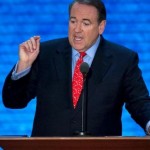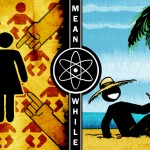Chuck Norris can divide by zero, cure cancer with his tears, sneeze with his eyes open, and tell you who would should be president. Entertainers have long been a major part of politics, from endorsements to running for office (I actually live in a state where the star of Conan the Barbarian is governor). The reasoning behind the overlapping of politics and entertainment seems to go something like this:
“While we are not experienced or trained in any way to hold office, or knowledgeable enough to tell you who to vote for, we are recognizable and popular, so vote for us or the candidate we support.”
Or, perhaps more simply:
“You enjoyed my role in (fill in the blank with a popular film), so vote for this candidate.”
I do not think we can minimize how telling it is that so many actors hold office or directly influence who does. Even more disturbing is how readily we take it for granted that celebrities play a central role in most elections. The reduction of everything in our culture to entertainment has dramatically affected the political process. In the current political race, one specific example of the blurring of entertainment and politics has particularly bothered me. Chuck Norris has been campaigning for Huckabee, endorsing him and appearing in commercials. Why would a washed up, typecasted “star” of marshal arts b-movies influence the way anyone votes?
In 2005, a website called Chuck Norris Facts sprung up around the idea of compiling ridiculous and hilarious “facts” about Chuck Norris. The site quickly became an internet fad, culminating with the actor appearing on television to read his own top ten favorite “facts.” The fad, which is now all but dead, was the last time Norris entered into the public’s awareness in any significant way; that is, until he began campaigning for Huckabee. With this background in mind, we can assume that the logic of Norris promoting Huckabee probably goes as follows:
“You enjoyed his internet fad, now vote for the candidate he supports.”
What does this tell us about the way Huckabee views the politically process and us as voters? Does he believe he will win votes from people who want a funny president? Does he believe that it is a good idea to equate his political beliefs with absurd “facts” about Norris? Does he believe that the decision to vote for a candidate should be based on the politician’s sense of humor or celebrity endorsements?
I’m not trying to assert that politics must always be serious. The issue is not whether or not we can laugh while discussing politics or endorsing a candidate. The issue is that we have developed a culture of humor and satire (as I’ve previously discussed) that stifles, trivializes, and reduces rational political discourse into entertainment. Laughing is a good thing, but we must always keep in mind what is at risk and why it is important. In November we will be voting for the person who will have the power to affect people and events all over the world, from war-torn Iraq to Darfur to our own economic “crisis.” Deciding who to vote for is not easy, especially this year. In order to vote wisely we need time, knowledge, and the resources to sort through the various candidates and their stances. We need our presidential candidates to be presenting themselves and their issues in a way that encourages us to think critically and discerningly, even if this means that we aren’t entertained.










